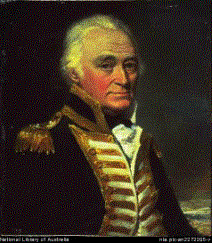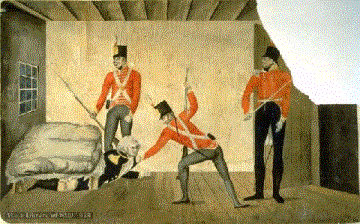Home
About This Project
Social Impacts
Economic Impacts
Sources and Links
|
|
|
SOCIAL IMPACTS
One of the social impacts that the liquor trade had on the colony was to cause increasing differences between the classes. The extortionate prices that were set by the officers affected the small incomes of the free settlers and emancipated convicts (Ross and Hearn 1988, pg 39). This meant that the officers in control of the spirit trade would have had a better quality of life, and were relatively more wealthy than most of the colony.

| Another social impact was the discontent that the trade in spirits had in the colony. The Governors Hunter and King used methods such as tax levies and other restrictions to try to reduce the spirit trade. Both came up against leaders in the trade, such as John Macarthur, to the eventual downfall of both governors, as Macarthur and others fought to protect their monopoly (Day 1992).
On a much larger scale, the Governor Bligh's attempts to restrict and stop the spirit trade led to all out revolt, in the Rum Rebellion. During Bligh's attempts to stop the spirit trade, the leaders in the trade accused him of tyranny and had him arrested (Brown 1998). |
| It would be hard to look at the social impacts of the liquor trade archaeologically, as it might not be possible to distinguish between the variety of reasons that would lead to evidence of social problems in the archaeological record. Evidence of social differentiation could be looked at to show the true extent of this at the time, as historical sources tend to either over- or under-exaggerate the differences depending on why the source was written. Historical records would probably have to be relied on to work out the causes of the differences. |

The Arrest of Bligh. Picture from Picman |
Related Links
 William Bligh's Second Mutiny William Bligh's Second Mutiny
|
|